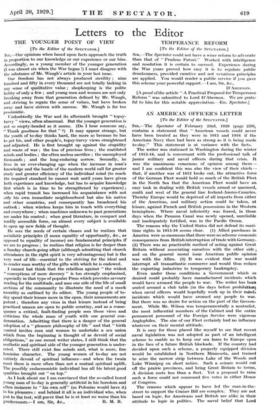Letters to the Editor THE YOUNGER POINT OF VIEW [To
the Editor of the SPECTATOR.] Sui,—Our opinions when based upon facts approach the truth in proportion to our knowledge or our experience or our bias. Accordingly, as a young member of the younger generation (I was almost six when the War began !) I must disagree with the substance of Mr. Waugh's article in your last issue.
Our freedom has not always produced sterility ; nine hundred and fifty in every thousand are not totally lacking in any sense of qualitative value ; shopkeeping is the polite hobby of only a few ; and young men and women are not only breaking away from that generation defined by Mr. Waugh, and striving to regain the sense of values, but have broken away and have striven with success. Mr. Waugh is far too pessimistic. rndoubtedly the War and its aftermath brought " topsy- turvy " views, often abnormal. But the younger generation is not so empty-headed as it seems. (Do I hear someone say, " Thank goodness for that " ?) It may appear strange, but the youth of to-day thinks hard, the more so because he has to get his, and other people's, topsy-turvy views straightened and adjusted. He is first brought up against the stupidity and waste of war ; the loss of precious lives ; the mutilated minds and bodies ; the often useless sacrifice ; the unemployed thousands ; and the long-enduring sorrow. Secondly, he lives in an ever-changing age when the increase in man's knowledge and the bustle of the modern world call for greater study and greater efficiency of the individual mind (to reach the required standard he cannot wait until years have given both experience and knowledge, but has to acquire knowledge first which is in time to be strengthened by experience) ; When rapid transit has increased his acquaintance with not only his own immediate neighbourhood but also his native and other countries, and consequently has broadened his outlook ; when wireless keeps him in touch with everything and everywhere ; when machines unknown to past generations are under his control ; when good literature, in compact and readily accessible form, on almost every subject is available to open up new fields of thought.
He sees the needs of certain classes and he realizes that socialistic principles (I mean equality of opportunity, &c., as opposed to equality of income) are fundamental principles if we are to progress ; he realizes that religion is far deeper than a Sunday church-going affair (although admitting that church attendance in the right spirit is very advantageous) but is the very root of life—essential to the striving for the ideal and to render man worthy of the gifts with which he is endowed.
I cannot but think that the rebellion against " the widest " conceptions of mere decency " is too strongly emphasized, especially in that type of popular Press which provides savoury reading for the multitude, and uses one side of the life of small sections of the community to illustrate the need of a mock morality as outlined by its editor. The young people of to- day spend their leisure more in the open, their amusements are patent ; therefore any vices in that leisure instead of being practised unseen are open to public scrutiny, and as a conse- quence a critical, fault-finding people sees those vices and criticizes the whole mass of youth with one general con- demnation. Admitting that there is a danger of the general adoption of a " pleasure philosophy of life " and that " birth control invites men and women to undertake a sex union which from the beginning is thought of as devoid of social obligations," as one recent writer states, I still think that the aesthetic and spiritual side of the younger generation is under- rated. There still exist fine minds and, what is more, fine feminine character. The young women of to-day are not entirely devoid of spiritual influence—and when the twain meet there is more often than not a mutual spiritual uplift. The possibly endaemonistic individual has all his latent good qualities brought out " on top."
As I look about me I am convinced that the so-called bored young man of to-day is generally artificial in his boredom and often insincere to " his own self" (as Polonius would have it) in his pleasures : and behind it all is an individual who, when put to the test, will prove that he is at least no worse than his predecessors.—I am, Sir, &c., R. M. B.
























































 Previous page
Previous page